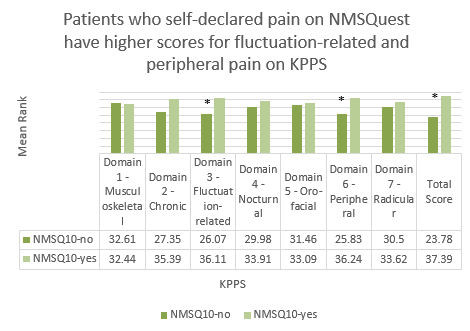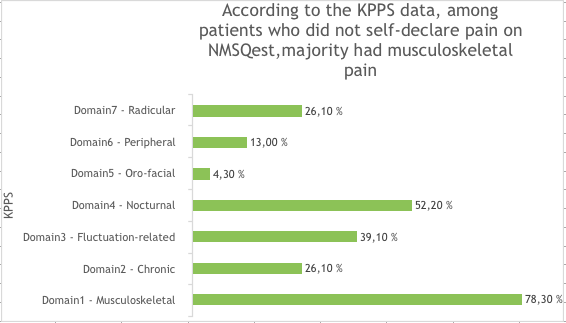Category: Parkinson's Disease: Non-Motor Symptoms
Objective: To determine the usefulness of patient related outcome (PRO) measures in highlighting non-declaration of pain, a challenging non-motor symptom (NMS) of Parkinson’s disease (PD).
Background: 40-85% of PD patients suffer from pain with a detrimental effect on quality of life.[1,2] Yet in PD pain often remains under-reported during routine consultations, despite of using PRO’s.[3]
Method: We analysed PRO data captured during clinical consultations using NMS questionnaire (NMSQuest) and compared them with data gained through the investigator completed King’s Parkinson Pain Scale (KPPS) in 64 PD patients (35.9% female, mean age 60.23±10.61yrs; mean disease duration 6.2±4.23yrs; mean LEDD 836.8±611.97mg; median H&Y stage 2).[4,5] All patients declared pain on KPPS. However, 23 patients declared no pain on NMSQuest(unexplained pain).
Results: Of 64 patients with pain captured through KPPS, only 41 patient (64%) self-declared pain via item 10 of the NMSQuest. In terms of sex, age, disease duration, LEDD and H&Y stage, there was no statistically significant difference between the group that self-declared pain on NMSQest and the group that did not. According to the KPPS data, among patients who did not self-declare pain on NMSQuest, majority(78.3%) had musculoskeletal pain. The rest were distributed as follows: 52.2%nocturnal, 39.1%fluctuation-related, 26.1%radicular, 13%peripheral and 4.3%oro-facial pain.[Fig.1.] Patients who declared pain on NMSQuest had statistically significant higher scores only on Items 5(“off”period dystonia”(Mean Rank (MR)) 36,65 vs. 25,11; p=0.007), Item 6(“generalised “off” period pain”(MR) 36,65 vs. 25,11; p=0,002), and Item 12(“burning pain in limbs”(MR) 35,24 vs. 27,61; p=0,028), Domain 3 (“Fluctuation-related pain”(MR) 36,11 vs. 26,07; p=0,027) and Domain 6 (“Discolouration; Oedema/swelling”(MR) 36,24 vs. 25,83; p=0,011) of KPPS and the higher total KPPS score (MR 37,39 vs. 23,78; p=0,004).[Fig.2.]
Conclusion: NMSQuest as a PRO for pain fails to pick up musculoskeletal pain in some PD patients where KPPS is effective. In addition, “unexplained” pain as noted in NMSQuest seems to signpost fluctuation related pain and peripheral pain, as defined by KPPS. NMSQ however, performs satisfactorily in relation to overall pain burden as defined by KPPS total score.
References: [1] Rukavina K et al. Pain in Parkinson’s disease: new concepts in pathogenesis and treatment. Curr Opin Neurol 2019;32(4):579-588. [2] Martinez-Martin P et al.The impact of non-motor symptoms on health-related quality of life of patients with Parkinson’s disease. Mov Disord 2011;26(3):399-406. [3] Chaudhuri et al. The non-declaration of non-motor symptoms of Parkinson’s disease to health care professionals: an international study using the nonmotor symptoms questionnaire. Mov Disord 2010;25(6):704-9. [4] Chaudhuri KR et al. International multicenter pilot study of the first comprehensive self-completed non-motor symptoms questionnaire for Parkinson’s disease: the NMSQuest study. Mov Disord 2006;21(7):916-23. [5] Chaudhuri KR et al. King’s Parkinson’s disease pain scale, the first scale for pain in PD: An international validation. Mov Disord 2015;30(12):1623-31.
To cite this abstract in AMA style:
K. Rukavina, M. Krbot Skoric, C. Borley, L. Batzu, A. Rizos, D. van Wamelen, K. Ray Chaudhuri. The non-declaration of musculoskeletal pain in Parkinson’s disease in patient-related outcome measures –The King’s experience [abstract]. Mov Disord. 2020; 35 (suppl 1). https://www.mdsabstracts.org/abstract/the-non-declaration-of-musculoskeletal-pain-in-parkinsons-disease-in-patient-related-outcome-measures-the-kings-experience/. Accessed January 29, 2026.« Back to MDS Virtual Congress 2020
MDS Abstracts - https://www.mdsabstracts.org/abstract/the-non-declaration-of-musculoskeletal-pain-in-parkinsons-disease-in-patient-related-outcome-measures-the-kings-experience/


